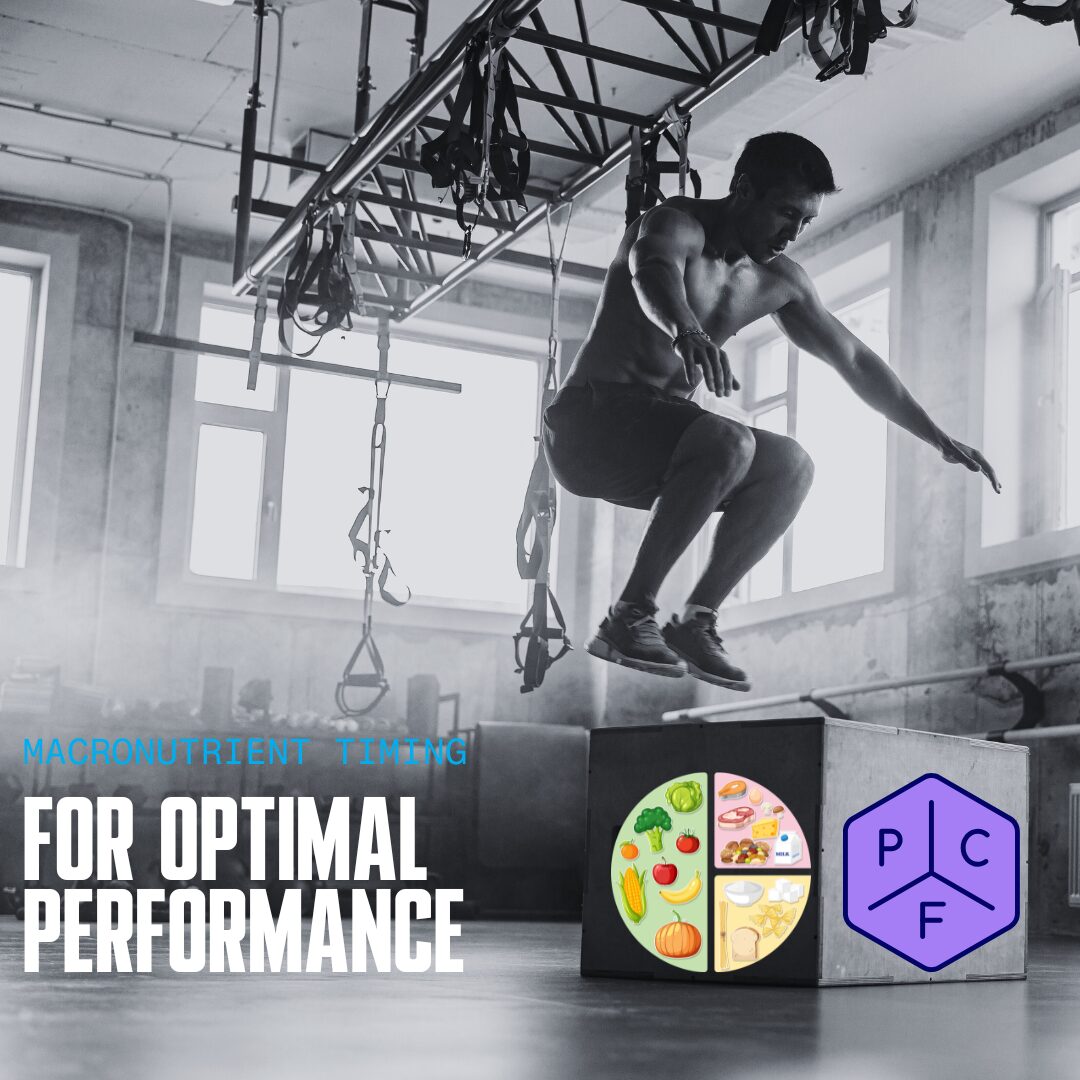Optimising performance and recovery through strategic nutrition is a key focus for athletes and active individuals alike. One area of increasing interest is macronutrient timing—the deliberate scheduling of carbohydrate, protein, and fat intake around training or competition to maximise outcomes such as muscle growth, fat loss, endurance, recovery, and overall performance. While total daily energy intake remains the foundation of nutritional planning, research suggests that when we eat may further enhance results when aligned with physical demands.
The Science of Nutrient Timing
Nutrient timing is built on the understanding that our bodies respond differently to nutrients depending on physiological state—such as whether we’re in a fasted, exercising, or post-exercise recovery phase. Immediately after exercise, muscles are more insulin sensitive and primed to absorb glucose and amino acids. This window, often referred to as the “anabolic window,” is considered optimal for nutrient delivery to stimulate muscle protein synthesis (MPS) and glycogen replenishment.
Carbohydrates: Fuel and Recovery
Carbohydrates are the body’s primary source of fuel during moderate to high-intensity activity. Pre-exercise carbohydrate consumption supports energy availability, preserves muscle glycogen, and can improve performance. Low glycaemic index (GI) carbohydrates consumed 1–3 hours before exercise have been shown to sustain energy and reduce perceived exertion during endurance efforts.
Post-exercise, carbohydrates are essential for glycogen replenishment, especially if the athlete trains again within 24 hours. The rate of glycogen resynthesis is highest within the first hour post-exercise, and delayed intake can reduce total glycogen storage. For optimal recovery, 1.0–1.2 g/kg of carbohydrates should be consumed within the first hour, followed by continued carbohydrate-rich meals every 2 hours for the next 4–6 hours.
Interestingly, combining carbohydrates with protein in the post-exercise window can enhance insulin response and glycogen resynthesis more than carbohydrates alone.
Protein: Timing for Muscle Protein Synthesis
Protein timing has gained significant attention due to its impact on muscle recovery and adaptation. Resistance training sensitises muscles to amino acids, particularly leucine, which stimulates MPS. Studies suggest that consuming 20–40g of high-quality protein within 1–2 hours post-exercise maximises the anabolic response.
Protein should also be distributed evenly across the day, approximately every 3–4 hours, to support continual MPS. This contrasts with traditional eating patterns that often skew protein intake toward the evening meal.
Furthermore, pre-sleep protein ingestion (around 30–40g of casein) has been shown to improve overnight MPS, particularly in athletes engaging in evening training sessions.
Fat: Less Critical, but Not Irrelevant
Unlike carbohydrates and protein, dietary fat does not play a major immediate role in fuelling or recovering from exercise. Fat digestion is slower, and its acute intake around training can delay gastric emptying, making high-fat meals less ideal immediately pre-exercise. However, fat remains crucial for overall energy balance, hormone production, and fat-soluble vitamin absorption, and should not be excluded from the broader nutrition plan.
For endurance athletes in particular, long-term adaptations to fat metabolism—via periodised low-carbohydrate or fasted training—are areas of ongoing research. While these methods may enhance fat oxidation, they do not consistently improve performance and should be used strategically, if at all.
Nutrient Timing for Different Training Goals
**1. Strength and Hypertrophy**
For muscle growth, pre- and post-exercise protein intake is essential. A protein-rich meal 1–2 hours before resistance training ensures amino acid availability during the session. Post-exercise protein (20–40g) stimulates MPS and enhances muscle repair. Carbohydrates post-exercise are also important to replenish glycogen and support training volume.
**2. Endurance Performance**
Endurance athletes benefit from carbohydrate loading in the days leading up to an event. On race day, a carbohydrate-rich meal (1–4g/kg) consumed 3–4 hours before the event ensures optimal glycogen stores. During prolonged exercise (>90 minutes), consuming 30–60g of carbohydrates per hour maintains energy and delays fatigue. Post-run recovery should focus on carbohydrate and protein to refuel and rebuild.
**3. Fat Loss**
For individuals focused on body composition, nutrient timing can help preserve lean mass while in a caloric deficit. Ensuring sufficient protein intake (1.6–2.2 g/kg/day), especially post-exercise, supports muscle retention. Training in a fasted state may increase fat oxidation, but doesn’t necessarily translate to greater fat loss and may impair performance or recovery if overused.
The Anabolic Window: Fact or Fiction?
The concept of a narrow anabolic window—often stated as within 30 minutes post-exercise—has evolved. Current evidence suggests that the window is broader, with benefits lasting up to several hours post-training. However, the importance of timing increases if the athlete trains multiple times per day or has not consumed a meal within a few hours prior to exercise.
Thus, while the precise timing is flexible, consistently aligning protein and carbohydrate intake with training sessions remains beneficial.
Practical Takeaways
– **Before Exercise:**
– 1–3 hours prior: Consume a balanced meal with low-GI carbohydrates, moderate protein, and minimal fat.
– Hydrate adequately.
– **During Exercise (for sessions >60–90 minutes):**
– 30–60g of carbohydrates per hour.
– Electrolyte and fluid replacement as needed.
– **After Exercise (within 1–2 hours):**
– 20–40g high-quality protein.
– 1.0–1.2g/kg of carbohydrates (more if training again within 24 hours).
– **Throughout the Day:**
– Spread protein intake evenly every 3–4 hours.
– Include a pre-sleep protein snack for additional recovery if needed.
Conclusion
While total daily nutrition remains the cornerstone of athletic performance, macronutrient timing provides a valuable edge for those looking to maximise results. Strategically timing the intake of carbohydrates and protein around exercise supports fuel availability, recovery, and training adaptation. Though individual responses vary, applying evidence-based timing strategies tailored to training type and goals can lead to meaningful improvements in performance and body composition.
References
- Jäger R, et al. Nutrient timing: A review of ISSN recommendations. *J Int Soc Sports Nutr.* 2017;14:33. [PMID: 28642676]
- Morton RW, et al. A systematic review, meta-analysis and meta-regression of the effect of protein supplementation on resistance training–induced gains. *Br J Sports Med.* 2018;52(6):376-384. [PMID: 28698222]
- Schoenfeld BJ, Aragon AA, Krieger JW. The effect of protein timing on muscle strength and hypertrophy. *J Int Soc Sports Nutr.* 2013;10(1):53. [PMID: 24299050]
- Trommelen J, van Loon LJ. Pre-sleep protein ingestion to improve the skeletal muscle adaptive response to exercise training. *Nutrients.* 2016;8(12):763. [PMID: 27916799]
- Jeukendrup AE. Periodized nutrition for athletes. *Sports Med.* 2017;47(Suppl 1):51-63. [PMID: 28224444]
- Ivy JL, et al. Early postexercise muscle glycogen recovery is enhanced with a carbohydrate–protein supplement. *J Appl Physiol.* 2002;93(4):1337-1344. [PMID: 12235031]
- Zawadzki KM, et al. Carbohydrate-protein complex increases the rate of muscle glycogen storage after exercise. *J Appl Physiol.* 1992;72(5):1854-1859. [PMID: 1601802]
- Burke LM. Re-examining high-fat diets for sports performance: did we call the ‘nail in the coffin’ too soon? *Sports Med.* 2015;45(Suppl 1):S33-S49. [PMID: 25500947]
- Aragon AA, Schoenfeld BJ. Nutrient timing revisited: is there a post-exercise anabolic window? *J Int Soc Sports Nutr.* 2013;10(1):5. [PMID: 23360586]

